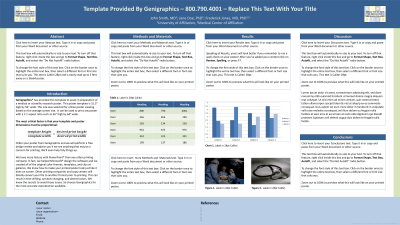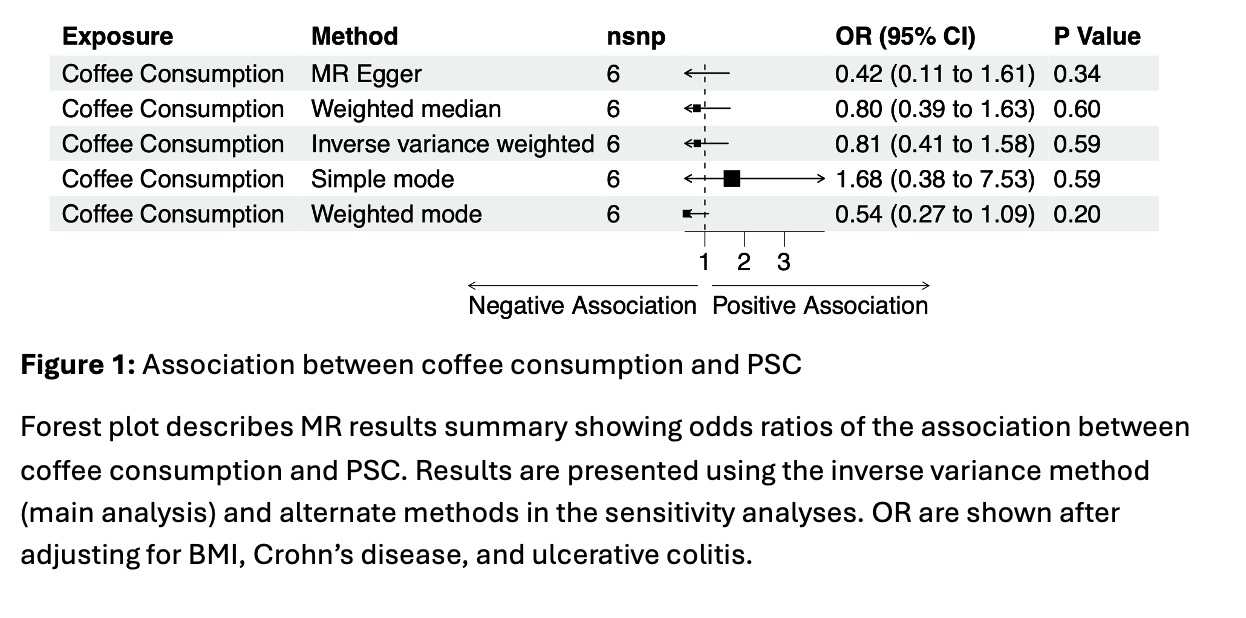Sunday Poster Session
Category: Liver
P1214 - Coffee Consumption and Primary Sclerosing Cholangitis: A Mendelian Randomization Study
Sunday, October 27, 2024
3:30 PM - 7:00 PM ET
Location: Exhibit Hall E

Has Audio
- MP
Manish Paranjpe, MD
Stanford Health Care
Stanford, CA
Presenting Author(s)
Manish Paranjpe, MD
Stanford Health Care, Stanford, CA
Introduction: Numerous observational studies have implicated increased coffee consumption with decreased risk of developing primary sclerosing cholangitis (PSC). Confounding from lifestyle-related factor limit interpretability of these studies. However, whether coffee consumption is casually associated with PSC is unknown.
Methods: In the present study, we took a two sample mendelian randomization (MR) approach to understand the causal association between coffee consumption and PSC. Genetically proxied coffee consumption was determined using summary statistic data from a genome wide association meta-analysis of coffee consumption. The meta-analysis included a discovery stage using UK Biobank participants (n = 85,852) and replication stage using the Nurses’ Health Study (n=10,675), Health Professions Follow-up Study (n=6,618) and Women’s Genome Health Study (n=22,691). Seven independent genetic variants were chosen to proxy coffee consumption. Genetically proxied risk of PSC was determined using summary statistics from a genome-wide association study of 4,796 PSC cases and 19,955 controls. Mendelian randomization estimates were estimated using the fixed-effect inverse-variance method as the main method. Sensitivity analyses were performed using weighted median, MR-Egger, and MR-PRESSO algorithms.
Results: Genetically-predicted coffee consumption was not associated with a decreased risk of PSC in the main analysis (OR 0.81, 95% CI: 0.41-1.58, P value 0.59) in the main analysis. Sensitivity analyses using the weighted median, MR-Egger, and MR-PRESSO algorithms confirmed a non-significant association between coffee consumption and PSC. This association was consistent after adjusting for genetically predicted smoking status, Crohn’s disease and ulcerative colitis.
Discussion: This mendelian randomization study does not support evidence of a casual association between coffee consumption and the development of PSC.

Disclosures:
Manish Paranjpe, MD. P1214 - Coffee Consumption and Primary Sclerosing Cholangitis: A Mendelian Randomization Study, ACG 2024 Annual Scientific Meeting Abstracts. Philadelphia, PA: American College of Gastroenterology.
Stanford Health Care, Stanford, CA
Introduction: Numerous observational studies have implicated increased coffee consumption with decreased risk of developing primary sclerosing cholangitis (PSC). Confounding from lifestyle-related factor limit interpretability of these studies. However, whether coffee consumption is casually associated with PSC is unknown.
Methods: In the present study, we took a two sample mendelian randomization (MR) approach to understand the causal association between coffee consumption and PSC. Genetically proxied coffee consumption was determined using summary statistic data from a genome wide association meta-analysis of coffee consumption. The meta-analysis included a discovery stage using UK Biobank participants (n = 85,852) and replication stage using the Nurses’ Health Study (n=10,675), Health Professions Follow-up Study (n=6,618) and Women’s Genome Health Study (n=22,691). Seven independent genetic variants were chosen to proxy coffee consumption. Genetically proxied risk of PSC was determined using summary statistics from a genome-wide association study of 4,796 PSC cases and 19,955 controls. Mendelian randomization estimates were estimated using the fixed-effect inverse-variance method as the main method. Sensitivity analyses were performed using weighted median, MR-Egger, and MR-PRESSO algorithms.
Results: Genetically-predicted coffee consumption was not associated with a decreased risk of PSC in the main analysis (OR 0.81, 95% CI: 0.41-1.58, P value 0.59) in the main analysis. Sensitivity analyses using the weighted median, MR-Egger, and MR-PRESSO algorithms confirmed a non-significant association between coffee consumption and PSC. This association was consistent after adjusting for genetically predicted smoking status, Crohn’s disease and ulcerative colitis.
Discussion: This mendelian randomization study does not support evidence of a casual association between coffee consumption and the development of PSC.

Figure: Figure 1: Association between coffee consumption and PSC
Forest plot describes MR results summary showing odds ratios of the association between coffee consumption and PSC. Results are presented using the inverse variance method (main analysis) and alternate methods in the sensitivity analyses. OR are shown after adjusting for BMI, Crohn’s disease, and ulcerative colitis.
Forest plot describes MR results summary showing odds ratios of the association between coffee consumption and PSC. Results are presented using the inverse variance method (main analysis) and alternate methods in the sensitivity analyses. OR are shown after adjusting for BMI, Crohn’s disease, and ulcerative colitis.
Disclosures:
Manish Paranjpe indicated no relevant financial relationships.
Manish Paranjpe, MD. P1214 - Coffee Consumption and Primary Sclerosing Cholangitis: A Mendelian Randomization Study, ACG 2024 Annual Scientific Meeting Abstracts. Philadelphia, PA: American College of Gastroenterology.
